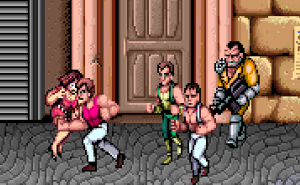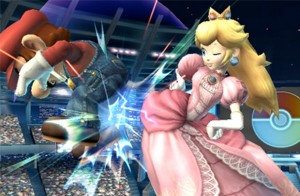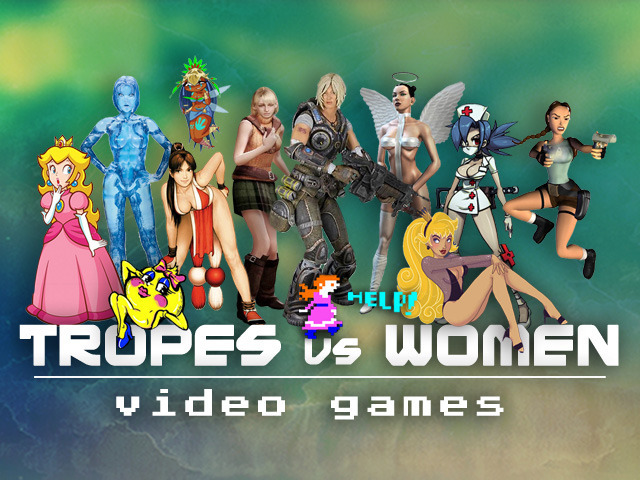 Anita Sarkeesian’s Kickstarted video series has finally made its debut, with the first episode, “Damsel in Distress: Part 1 – Tropes vs Women in Video Games” appearing online yesterday. I could fill a thousand pages with discussions on the making of these videos, the allegations of broken promises, their late arrival, the abuse Anita Sarkeesian received and the bile and vitriol that has spread all over comments threads and message boards.
Anita Sarkeesian’s Kickstarted video series has finally made its debut, with the first episode, “Damsel in Distress: Part 1 – Tropes vs Women in Video Games” appearing online yesterday. I could fill a thousand pages with discussions on the making of these videos, the allegations of broken promises, their late arrival, the abuse Anita Sarkeesian received and the bile and vitriol that has spread all over comments threads and message boards.
Instead, Lets just look at what she’s actually made.
Before we do though, I’ll just lay my cards on the table and say that I’m not going to discuss whether this video should even have been made in the first place, or whether this is a “made up” issue. For me, it’s not. It’s an important one. If people are getting so angry, there must be something worth talking about here, so I’m not going to start by arguing about whether she should have made these videos in the first place. I think its great that someone is tackling the issue, I think videogaming writing and character design is often bad or lazy, and I think that women are often portrayed very poorly in games. So I’m going to review this video as it is, based on its content and presentation and how well it tackles (what I think) is one of the biggest problems in games.
Why don’t you watch it first?
From the start, the presentational style is somewhat like a High school educational video or health and safety feature. If anyone has seen Sarkeesian’s video before, this will be very familiar. I expect this to disappoint many people. While it shouldn’t be underestimated how time-consuming, and even expensive it can be to produce high quality video content, the talking head format is sure to draw criticism from those who ask where all the Kickstarter money went. I personally expected some kind of differentiation between this and her previous work. Perhaps I was too optimistic, but I hoped for more of a documentary style. I know she was clear about what to expect from this series, but I still secretly hoped for some interaction with industry figures, interviews or even some shots on location to bring some variety to the episode. As it is, the talking head format makes the subject feel dry and academic.
 Despite these criticisms, Sarkeesian is well researched on the subjects, and there’s nothing amateur or shoddy about her presentation or the quality of the video. Her diction is clear and confident, and I can’t imagine it’s easy to sound so self-assured in the face of so many hateful comments and death threats. She certainly presents the subject better than I could under the same circumstances. I know that if I Googled my name, and the third picture was a Photoshopped image of my bruised and battered face, I might struggle to finish a video that would make even more people hate me.
Despite these criticisms, Sarkeesian is well researched on the subjects, and there’s nothing amateur or shoddy about her presentation or the quality of the video. Her diction is clear and confident, and I can’t imagine it’s easy to sound so self-assured in the face of so many hateful comments and death threats. She certainly presents the subject better than I could under the same circumstances. I know that if I Googled my name, and the third picture was a Photoshopped image of my bruised and battered face, I might struggle to finish a video that would make even more people hate me.
Still, her delivery throughout is a little dry and she struggles to be a likeable on-screen presence. Not that this diminishes her arguments, you don’t have to like her to agree with her, but it does impact on how convincing those arguments will be to gamers, many of whom already feel victimized by a mainstream press that’s always portraying the negative aspects of gaming. To some extent, we gamers are a bit punchy when it comes to criticism, so when we’re attacked we tend to be reactionary, and you can understand why. Games don’t make us go out and buy guns and shoot up schools, no matter what the media tells us, but when someone criticizes a broad swathe of games we love, we can’t help but react with a resigned sigh of “Oh great, another person telling us we’re wrong for enjoying our hobby!”
 But looking at the actual argument she puts forward in this first episode, she brilliantly explains how Princess Peach is “the ball” in a game between two male characters: Mario and Bowser. This is a good way of framing the argument, and a good lens to view the content of these games through. Criticizing Mario won’t win her many supporters in the game community, but if anyone actually listens to her she has a good point. Modern games are built on a foundation of classic archetypes, and developers can choose to slavishly follow them, or move away from them. Just because Mario has always saved Princess Peach doesn’t mean he always has to.
But looking at the actual argument she puts forward in this first episode, she brilliantly explains how Princess Peach is “the ball” in a game between two male characters: Mario and Bowser. This is a good way of framing the argument, and a good lens to view the content of these games through. Criticizing Mario won’t win her many supporters in the game community, but if anyone actually listens to her she has a good point. Modern games are built on a foundation of classic archetypes, and developers can choose to slavishly follow them, or move away from them. Just because Mario has always saved Princess Peach doesn’t mean he always has to.
Indeed, at this point, some of the cultural traditions of Japan could probably have been discussed. This is possibly a blind spot for the documentary as a whole, as it takes a very US-centric approach to the issue. Gender issues are VASTLY different in Japan to the US, and as gaming owes so much of its heritage to its Japanese roots, this is probably something she should have looked at in detail. That being said, her inclusion of ads for Mario 2 in its original version (Doki Doki Panic) were both well observed and illustrative of how deep Sarkeesian’s knowledge of gaming culture is, or at least how well she researched the subject.
The video does spend a lot of time looking at the Mario games, before moving on to the Zelda series. Throughout, she chooses appropriate clips to use, many of which are funny or interesting to games historians, and the whole thing is edited really well.
 Still, the tone throughout is very dry, and Sarkeesian misses the opportunity to make fun of the ridiculousness of the games. She makes some good choices about which games to present to support her argument, and often their inherent ridiculousness is funny in itself while helping illustrate her point. The Dragons Lair Princess is a great example of a toe-curlingly terrible example of poor design of a female character. But still, her own demeanor hardly cracks, and at some points you feel like her professional persona is a mask that hides any real feeling she has. There’s a school teacher tone that she adopts and it’s perhaps intentional.
Still, the tone throughout is very dry, and Sarkeesian misses the opportunity to make fun of the ridiculousness of the games. She makes some good choices about which games to present to support her argument, and often their inherent ridiculousness is funny in itself while helping illustrate her point. The Dragons Lair Princess is a great example of a toe-curlingly terrible example of poor design of a female character. But still, her own demeanor hardly cracks, and at some points you feel like her professional persona is a mask that hides any real feeling she has. There’s a school teacher tone that she adopts and it’s perhaps intentional.
At a few points her underlying feelings come out, and these are when the incidents of sexism are at their most egregious. Her argument is strong when she discusses Double Dragon, and she justifiably labels it as “regressive crap”. At this point, she seems most human as a tinge of anger comes through her otherwise professional demeanor, and I found myself thinking, “Fuck yeah, that’s not right!”. This part of the video, towards the end, was the point when I would have been most ready to join Sarkeesian if she issues some kind of rallying cry. Perhaps we should punch that games developer in the stomach and carry him over our shoulders? Yeah, I’ll do it! No, wait… I should calm down.
 The strongest point made is how the characters in the Zelda games are often strong and independent…. until they don the conventional Zelda outfit. At that point they are invariably captured. This re-casting of their character as a plot device, losing their agency, is telling. I agree with her that about Tetra from Wind Waker being highlighted as a strong female character.
The strongest point made is how the characters in the Zelda games are often strong and independent…. until they don the conventional Zelda outfit. At that point they are invariably captured. This re-casting of their character as a plot device, losing their agency, is telling. I agree with her that about Tetra from Wind Waker being highlighted as a strong female character.
Sadly, her underlying cynicism comes through when discussing aspects of gaming completely removed from the central issues of sexism in games. For example, when discussing retro remakes and re-releases, she is quick to label the platform holders as greedy to exploit nostalgia. When her tone is already condemnatory towards sexism, it would help if her attitudes towards other aspects of gaming were more positive. In this case, many gamers love retro remakes. Beyond that, they just love games! Without a similar love of games being evident in her delivery, Sarkeesian starts to seem as if she is critiquing the whole industry and culture of gaming rather than tackling the issue. It’s a subtle point, but if her delivery seems too shrill then it might be because her justifiable cynicism about sexism is bleeding over into the industry as a whole. We already have enough people decrying the terrible state of modern gaming, it would be nice to have a few more people telling us how exciting, positive and life-affirming gaming can be.
 Her tone softens towards the end when she tells us about her history as a gamer. There’s a tiny window that she opens up showing her gaming childhood, but she might have gotten more people on-board if she’d featured this at the start. We are always told by non-gamers how terrible we all are, it would be nice if she self-identified at the start as “one of us”.
Her tone softens towards the end when she tells us about her history as a gamer. There’s a tiny window that she opens up showing her gaming childhood, but she might have gotten more people on-board if she’d featured this at the start. We are always told by non-gamers how terrible we all are, it would be nice if she self-identified at the start as “one of us”.
So overall, while the video started slowly and was somewhat limited by its format, I thought that by the end Sarkeesian had made her arguments and justified them effectively. I was surprised she didn’t mention the Bechdel Test and the pace of the whole thing was a bit slow, but by the end I was ready to watch more, and it’s fair to say I warmed to her presentational style and her method of delivery as the episode progressed. I would still love to see some more interviews and industry insight, and even some locations just to liven the whole thing up, but as it stands this is a good primer on sexism in games, and something almost every games developer should watch before they design another terrible female character.
Should I score this? Hmmm. I guess I could!
7 Tetra’s High Sea Adventures out of 10
